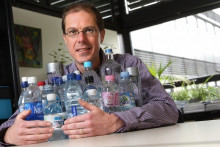In his research, he mapped out humanity’s water footprint from month to month in relation to the availability of water. Previous research in this field focused on water shortage on an annual basis and was only carried out in the largest catchment areas. Hoekstra’s research goes into more detail.
'Significant progress'
‘We are receiving a great deal of media attention worldwide,’ reports Hoekstra. 'From the New York Times and the Guardian, to the South China Morning Post. As well as many enthusiastic responses from researchers: we have made significant progress in assessing the global shortage of fresh water, in great detail, both geographically and in terms of time. We know exactly where water is going, at any place and at any time, to which sector, or even which product.’
Shortage of drinking water
Of the four billion people mentioned, a large number experience the consequences of water scarcity, the depletion of water in a specific area, directly. In Mexico, the western US, northern and southern Africa, southern Europe, the Middle East, India, China and Australia, there is a regular shortage of drinking water, or industries or farmers experience problems.
‘Increasingly, water is moving higher up the agenda. Not only in the countries battling serious water shortages, but also for the businesses that work in these regions or obtain their raw materials there, and for investors who want to know the water risks of new projects.’
Developing better models
Hoekstra says all those parties require reliable data. ‘Even in a country like the Netherlands, which is not particularly scarce in water, global water scarcity is of great importance, because a considerable proportion of our food comes from regions scarce in water, where water is gradually being depleted.’
Hoekstra’s research team is continuing to develop even better models. ‘But we are also looking at solutions for more sustainable and efficient use of water. We are looking at the relationships between water, energy, climate and food, because sustainability requires an integrated approach.’
‘Businesses have no idea’
As a solution to water scarcity, the researcher is considering benchmarks for the water footprint of products. ‘To ensure that we know what a reasonable amount of water consumption per product is. At present, businesses really have no idea, resulting in water consumption usually being unreasonably high. There are no stimuli for using less water. In addition, we need to establish monthly water footprint caps for catchment areas and authorities must not allow consumers to use more water than exceeds the maximum sustainable level.’









